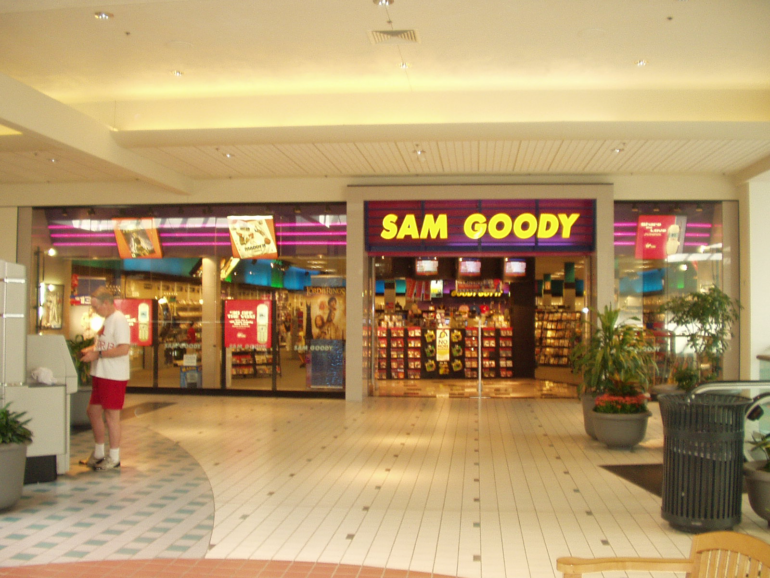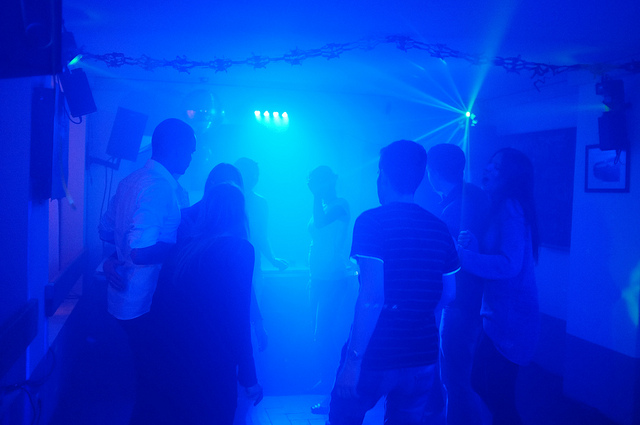Melissa Ragsly
1990. Empty houses and sleeves of saltines. There is no other place to go.
We exist in the middle. Middle class, mid-range stores, in the middle of Long Island. The center of the mall, a circle of people-watching benches. A cloud of Drakkar hits you before the lacrosse players pass you by.
The aisles are Aquanet-hardened hair and acid-washed jeans so tight you need a wire hanger to toggle up the zipper. My mother shops in homewares for potato peelers and pineapple molds. I peruse the clearance rack for summer clothes. The adult section. A Large and sometimes an Extra Large. I wear big t-shirts and bicycle shorts that stretch.
A FINAL SALE sign, like a Christmas tree topper, springs up from the center of a circular rack. Misfit items with red marked tags. A scale of lower and lower prices. The unwanteds swing like calliope horses.
I find a t-shirt and black bicycle shorts. The t-shirt has fluorescent pink stick figures. A $5 bill stuffed in my bra. I’ll get back change.
I think of the free samples of black pepper chicken on toothpicks at the food court. If you come from one direction, you can turn around and come from the other and take a second piece. No one will know.
The cashier is young but wears clothes like a mother. A blazer and fake leather JCPenney pumps. She smiles. She doesn’t mean it.
You never know what a stranger will say to you. A glance. An up-and-down. A head-to-toe. She holds the shorts up to the light. The elastic waist stretches. She says, These look small. She looks at me again, as if to say You are not.
The shorts aren’t for me, I lied. My cash is clammy. She counts change.
To enter the food court, you pass a sculpture by Alexander Calder who once made silver earrings for Peggy Guggenheim. When you pass it, you feel like you are elsewhere. You slip into a white hallway. The air is enough for everyone. No one eats black pepper chicken.
Find what you want. Take what you want. Even if that’s nothing.
After school, Ellie and I eat pudding cups. We change into baggy jeans and grandpa cardigans. The bus only takes exact change. It’s a twenty-minute ride to the mall.
Sam Goody’s lights are bright. Turquoise and purple squiggles on the walls. Cassettes alphabetized in the back. Posters mounted on a black metal carousel. We flip them around. Permission is a matter of angles. We need permission to say something about a person to the world, but no permission to say things to someone’s face.
I think of a video I saw on a VHS copy of an MTV show I watched when I came home from school. I remember how it looks. Black paint on white walls. Graffitied words. The pageant of corruption. Home is not safe. Silence = Death.
I look for Bob Mould. One copy of Black Sheets of Rain high on the shelf. The cassette is attached to a plastic security device that looks like a ladder. I squat down. A little wiggle. The cassette slips out of the sleeve. Ellie flips the poster display. She looks like something is holding her back.
Sometimes it takes doing the wrong thing to make people notice you. Ellie tries to get my attention. My pockets weren’t filled. I feel a hand on my shoulder.
I sit in a dark office. The desk lamp, a spotlight. Who are you? Invoices and paperwork pile up on the desk. Polaroids of previous shoplifters. All guys, all ages.
How old are you? I say as little as possible. Are you here with anyone else? What’s your parents’ number? I never break. My lips stay closed. A toothless smile. There are no tears.
They tell my mother if I would have cried, they would have let me go right away. Had they waited for the boys with metal t-shirts to cry too?
Melissa Ragsly is the author of the collection We Know This Will All Disappear. Her stories have appeared in Best American Nonrequired Reading, The Iowa Review, Joyland and other journals. She’s currently working on a book about MTV’s 120 Minutes, writing TV pilots and working at an independent bookstore in the Hudson Valley where she lives. Follow her on Twitter at @90sMelissa.



